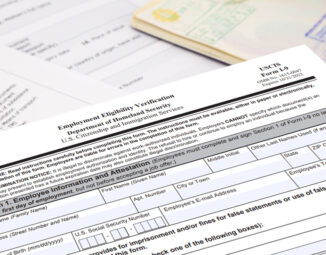Supreme Court Agrees to Review Major Immigration Case Just as the Presidential Election Heats Up
Immigration is already a major issue in this year’s presidential race, as candidates from both parties try to score political points out of the presence of roughly eleven million undocumented immigrants in the country and the effects such a number has on issues such as health care, education, traffic safety, national security, and the economy.
On Tuesday, January 19, 2016 the Supreme Court agreed to hear the federal government’s appeal of a Fifth Circuit decision upholding a Texas Federal Court injunction of a key reform measure announced by the Obama administration in November 2014. The Court is expected to hear oral arguments in the case in late April, with a decision expected in late June, right in the middle of a heated election season.
In February 2015 HRLegalist reported that a federal judge in Texas had ruled in favor of the state of Texas and 25 other states seeking to enjoin a plan announced by President Obama in November 2014 that would expand a program known as Deferred Action for Childhood Arrivals (DACA) for immigrants who entered the U.S. as children, and would create a similar program for certain immigrant parents without legal status known as Deferred Action for Parents of Americans and Lawful Permanent Residents, or DAPA. Under both programs, eligible individuals could apply for delayed deportation and employment authorization for three-year periods. They would also become eligible to apply for a social security number and a driver’s license. Following the injunction, USCIS stopped receiving applications for benefits under these new programs pending the administration’s appeal to the Fifth Circuit, which upheld the injunction on November 9, 2015, finding that the states had shown a “substantial likelihood” of winning on their Administrative Procedure Act claims.
In granting certiorari, the high court asked the federal government and the states to present arguments on whether the executive action in question runs afoul of the “take care” clause of the Constitution, which requires the president to “take care that the laws be faithfully execute,” a key element of the states’ arguments below. Often when a lower court does not decide a legal question the Supreme Court will decline to do so as well. The fact that the Justices specifically called for the parties to weigh in on the “take care” clause could mean that at least four Justices believe the states’ argument has some merit; or, it may just mean that the justices want to make sure that the all legal bases are covered.
At stake in this case for employers is this: if the Supreme Court rules in the federal government’s favor, the expanded immigration benefits in question here would extend employment authorization to upwards of 4.4 million people, many of whom have been working illegally until now. If approved, the DAPA and the expanded DACA programs will pose many thorny legal issues for employers related to I-9 compliance. Employers should review USCIS guidelines and consult with an experienced immigration attorney in advance in order to be prepared. June may seem a long way off, in these short, cold, snowy days of winter, but it is wise to get the information you need now so that the Supreme Court decision doesn’t catch you off guard.



